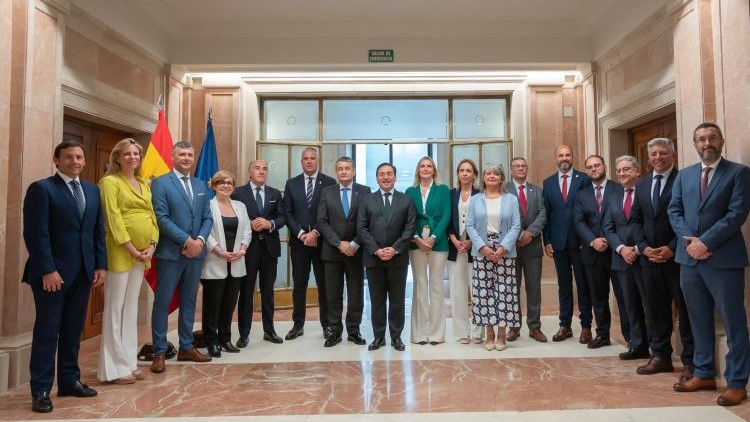Eduardo González
The Minister of Foreign Affairs, José Manuel Albares, received yesterday in Madrid the representatives of the Government of Andalusia and the municipalities of Campo de Gibraltar to explain the evolution of the negotiations on the future of Gibraltar in the EU. During the meeting, both the Andalusian Government and the mayors asked him for measures to guarantee economic balance between the two sides of the border, including the granting of their own tax status similar to those of the Canary Islands or Ceuta and Melilla.
As the minister explained in the press conference after the meeting, held at the Ministry’s headquarters in Madrid, during the meeting the progress made after the high-level meeting on April 12 in Brussels between Albares himself, the vice president, was discussed. of the European Commission, Maros Sefcovic, and the British Foreign Minister, David Cameron, in which, he assured, “general political lines that include the airport, goods or mobility, among other issues” were agreed.
“I have also offered the mayors information on matters of interest, such as the elimination of the Fence, the use of the airport, the free movement of people and goods, the rights of workers, which, of course, we are going to safeguard and therefore those that this Government protects, and the position of sovereignty of Spain, which remains intact and safeguarded,” he added.
The objective of the agreement, according to the minister, is to create “an area of shared prosperity” that “will open, once we reach it, a new stage of coexistence between the Campo de Gibraltar and Gibraltar after so many years.” Likewise, he continued, it will allow “those close economic, commercial and personal relationships, which in the region are already normal in fact, to also be normal by law” and will help avoid “situations of mistrust, incidents and inequality that are not justified.”
Albares did not want to give details about the negotiations (including some demands from the region regarding environmental management, tax equalization and the fight against smuggling) because of the complexity of the negotiations, which also concern other Ministries, such as the Interior, Defense and Finance.
The minister also did not provide details about the airport (border controls or application of the Schengen Treaty), although he did highlight that its shared use, as already happened between 2006 and 2011, will help to “boost the local economy.” “Today I said goodbye to the mayors, wishing that the next meeting could be with a flight from that airport to Madrid and not with the complexities that exist at the moment,” he concluded his intervention.
Government of Andalusia and municipalities
After the press conference, local representatives appeared before the media. The first to do so was the counselor of the Presidency of the Government of Andalusia, Antonio Sanz, who expressed his gratitude for a meeting that, in any case, lacked “depth and concreteness” and acknowledged that he would have liked it to have been “much earlier.” since the last meeting of this type took place “in May 2022”.
“The Government of Andalusia always acts from institutional loyalty, discretion and responsibility, but demands to participate, as in other negotiations,” because “the statute of autonomy allows us to participate in negotiations related to issues that directly affect us, and who “They affect more than us?” he continued. “Why does Gibraltar participate, invited by the United Kingdom, and why does the Government not invite Andalusia?” added Sanz.
“Yes, we want an agreement, but not just any agreement, not behind the backs of the Campogibraltarians,” he warned. For this reason, he explained, the Andalusian Government had proposed to the minister, during the meeting, the creation of “a tax statute for Campo de Gibraltar, like those of the Canary Islands or Ceuta and Melilla,” because it is “a unique situation in Europe and in the world” and because, without taking into account this “fiscal singularity, it will be impossible to compete on equal terms when the gate is opened.” “The EU should support us, European regulations allow it,” he warned.
Specifically, Article 107 of the Treaty of the European Union establishes that “aid intended to promote the economic development of regions in which the standard of living is abnormally low or in which there is a serious situation of poverty” may be considered compatible with the internal market. underemployment, as well as that of the regions contemplated in article 349, taking into account their structural, economic and social situation.” This article 349 refers, specifically, to the outermost regions (with express mention of the Canary Islands) and among the measures contemplated, “without endangering” the internal market and common policies, fiscal policy is included.
Sources present at the meeting told The Diplomat that this request was supported, more or less in the same terms, by all attendees, and that Albares promised to address the issue with the Ministry of Finance.
For his part, the mayor of Algeciras, the popular José Ignacio Landaluce, warned of the important tax difference that exists between Campo de Gibraltar and the Rock and assured, in this regard, that the minister did not specify if any measure was going to be adopted to guarantee fiscal balance between the two parts of the border. “Remove barriers, yes, but at any price, no,” he said. “We need to know what the taxation is, to equalize ourselves, because if this tax disparity continues, it will be full-fledged fiscal dumping,” he added.
In a similar sense, the mayor of San Roque, the socialist Juan Carlos Ruiz Boix, defended the adoption of fiscal harmonization policies through the granting of “a special fiscal status” for Campo de Gibraltar, “the only territory in the EU.” that has border relations with a colony, such as Gibraltar.”
For his part, the mayor of La Línea de La Concepción, the independent Juan Franco, assured, as “mayor of the city most affected” by Brexit, that he had left the meeting with Albares with “relativistic optimism” and valued the “discretion” of the minister in “extremely complex negotiations” due to possible reactions in the Houses of Commons and Lords in the United Kingdom. “For me, the most important thing is that the main problems that are on the agenda of the La Línea City Council, such as the situation of workers, pensions and other issues such as the future of the airport and Customs, are on the agenda. of the minister and they are working hard,” he added.
Finally, Susana Pérez, president of the Commonwealth of Municipalities of Campo de Gibraltar, assured that the 300,000 residents of the region are waiting for this agreement “like water in May” and stated that the eight municipalities in the area do not care “if it is sign the agreement on a Monday or Thursday, in May or December, the important thing is the content, what is signed, because it can be the starting signal for the creation of wealth, for the prosperity of the region, which historically has many needs”.







